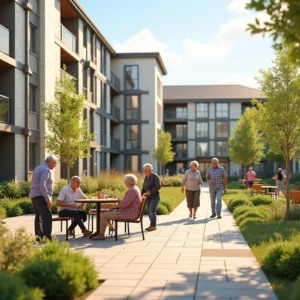Music has long been described as a universal language. It’s something that transcends words, connects generations, and stirs emotions deep within us. As we move into our senior years, the role of music takes on even greater significance. Whether it’s through a favourite song from decades past or singing in a group, music holds a unique power to enhance quality of life, spark memories, and lift the spirit.
Contents
Why Music Matters in Later Life
Recent research reinforces what many of us already sense: music isn’t just enjoyable; it’s beneficial. Studies show that engaging in musical activities can deliver wide-ranging benefits for older adults:
- Cognitive benefits: Active music making has been shown to improve concentration, memory, and overall cognitive functioning. One UK-based study found that older adults involved in musical activities scored higher on well-being measures than those in non-musical social groups.
- Emotional & social benefits: Music promotes positive emotions, reduces stress and depression, and fosters social connection. For many seniors, taking part in musical activities means belonging, participation, and purpose.
- Physical and physiological benefits: Listening to or making music can impact heart rate, reduce anxiety, enhance sleep quality, and even support balance and motor functions when paired with movement.
- Memory and reminiscence: For older adults, especially those with dementia or memory issues, music taps into parts of the brain that remain responsive long after other cognitive functions decline.
In fact, a national poll found that 98% of adults aged 50–80 reported some health-related benefit from music. Most commonly, stress relief, improved mood and motivation.
Music as a Tool in Senior Care Settings
In care settings, the affording of musical opportunities can have profound effects. At a care home, for example, including musical activities among the daily routine might mean: a sing-along, a visiting musician, a simple instrument session, or curated playlists tied to residents’ youthful memories.
Take the example of a specialist Burton-on-Trent care home where music can become as vital to the environment as comfortable chairs or gardens. Here’s how music can enrich such a setting:
- Personalized playlists: Playing songs from someone’s teenage or early-adult years often triggers smiles, conversation, and recollection of those times.
- Group activities: A communal singing session brings laughter, camaraderie, and physical involvement (clapping, movement), which boosts social and physical well-being.
- Memory support: For residents experiencing memory loss, familiar music may help them reconnect with identity, assist in self-expression, and reduce agitation.
- Well-being enhancement: Relaxing music during quieter times (evening wind-down) can support sleep quality, reduce anxiety, and promote calm.
Practical Tips for Embracing Music in Later Life
For seniors, caregivers, or families wanting to adopt music as part of the aging journey, here are some practical suggestions:
- Find meaningful songs: Seek out music that resonates personally, perhaps the pop hits or big band era they enjoyed in youth, or songs associated with special life moments. This boosts relevance and emotional connection.
- Mix listening with doing: While listening is great, participation is even more powerful. Singing, tapping, playing percussion (e.g., simple handheld instruments), or joining a choir/group activity enhances benefits. Research shows that making music yields stronger cognitive and social returns.
- Match the moment: Use music to match mood and occasion—upbeat for energy and motivation; slower, soothing tunes for relaxation or winding down. Studies show that even background music can positively affect processing speed and memory in older adults.
- Create a social setting: Music shared is music multiplied. Encouraging group listening or performance helps combat loneliness and fosters community—a key benefit for older adults.
- Keep accessibility in mind: Hearing or mobility issues may limit participation; ensure volume is comfortable, devices are easy to use, and instruments or activities are adapted for comfort.
A Final Note: The Soundtrack of Aging Gracefully
As we sail into our later years, the narrative often focuses on challenges, like health issues, cognitive decline, and loneliness. Yet, music offers a hopeful and proactive strand: a way to engage, connect, remember, and feel alive. For residents and staff, it’s a simple yet powerful addition that supports dignity, joy, and human connection.
Because in the end, music isn’t just background. It becomes a symphony of meaning, memory, and wellbeing throughout the golden years.




